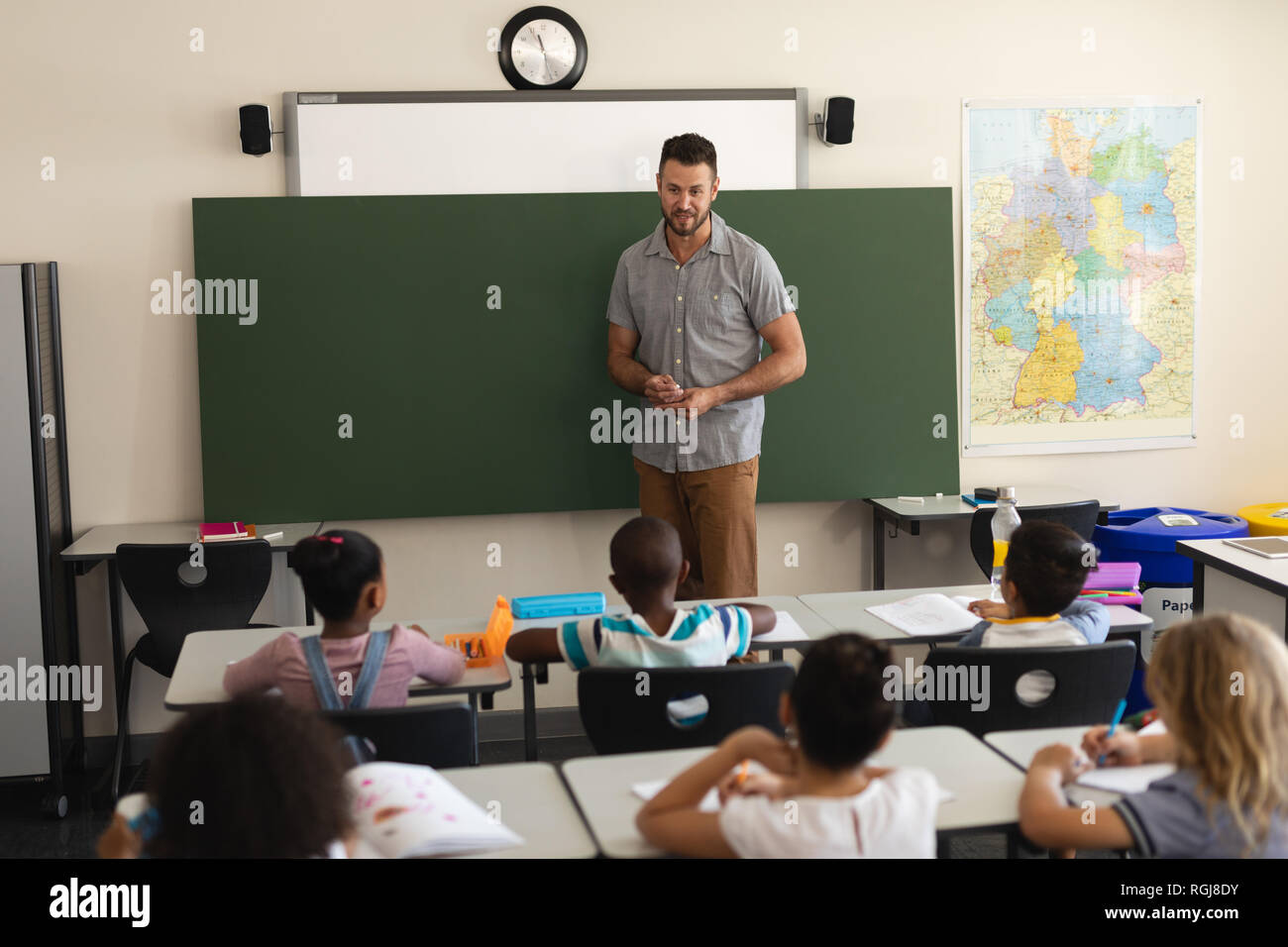Discover the Necessary Benefits of Recognizing Main Scientific Research for Young Students
The value of key science education and learning for young learners extends far past plain understanding purchase; it serves as a fundamental column in creating crucial abilities such as important thinking, problem-solving, and creativity. Involving with clinical principles via inquiry-based and interactive tasks not only cultivates inquisitiveness yet additionally lays the foundation for resilient, confident learners.
Enhancing Crucial Believing Abilities
Cultivating critical believing skills in young students is essential for their cognitive advancement and future scholastic success. Important reasoning allows youngsters to examine information, examine evidence, and make notified decisions, which are crucial abilities in today's information-rich culture. By participating in clinical inquiry, young learners can boost these abilities as they discover concepts with experimentation, reasoning, and observation.
In main scientific research education and learning, instructors can promote vital thinking by urging pupils to ask inquiries, develop hypotheses, and conduct experiments. This hands-on approach permits kids to exercise analytical and develop sensible thinking skills. For instance, when trainees explore the buildings of products or the concepts of movement, they discover to analyze their searchings for seriously and reason based upon proof.
Additionally, conversations and collective tasks can promote critical reasoning by giving possibilities for students to verbalize their thoughts, obstacle assumptions, and take into consideration varied viewpoints. By developing an encouraging atmosphere that values query and reflection, educators can nurture crucial thinking skills that empower young learners to become long-lasting students and independent thinkers. Ultimately, improving these abilities lays a durable foundation for their future scholastic undertakings and personal growth.
Promoting Interest and Exploration

Main scientific research education gives a structured setting where young learners can check out various sensations through hands-on experiments and monitorings. By enabling them to connect with products and participate in inquiry-based learning, instructors produce possibilities for kids to formulate hypotheses, test their concepts, and attract verdicts. Such experiences support a feeling of wonder and exhilaration regarding scientific research.

Building Confidence in Issue Resolving
Building confidence in analytic is an essential component of primary scientific research education that equips young students to come close to difficulties with resilience and creativity - primary science tuition Singapore. When youngsters are urged to engage with scientific concepts via hands-on activities and inquiry-based knowing, they develop important abilities in important thinking and analysis. This procedure not just improves their understanding of scientific principles however likewise fosters a sense of ownership over their discovering
To construct self-confidence, educators ought to develop a helpful environment where errors are deemed possibilities for growth as opposed to failings. This encourages pupils to take risks and discover various remedies to issues. By providing scaffolding and support, teachers can aid trainees navigate complicated jobs, slowly increasing their freedom in problem-solving circumstances.
Additionally, joint learning experiences, such as group tasks or experiments, can further enhance students' confidence as they learn to verbalize their ideas and pay attention to others' perspectives. These interactions support social abilities and enhance the idea that analytical is commonly a cumulative endeavor. Inevitably, cultivating confidence in analytic prepares young learners for future academic obstacles and furnishes them with the devices essential for lifelong knowing.
Motivating Imagination and Innovation
In the realm of key scientific research education and learning, encouraging creativity and advancement is important for growing a dynamic understanding setting. By cultivating a society where young learners can discover ideas and experiment openly, teachers aid trainees develop essential believing abilities and an enthusiasm for exploration. Creative thinking in science urges children to ask inquiries, devise theories, and engage in hands-on tasks that stimulate their creative imagination.
Integrating flexible tasks and inquiry-based discovering into the curriculum permits students to reveal their unique viewpoints and services. When charged with addressing a problem related to their atmosphere, trainees can conceptualize numerous approaches, leading to innovative results that display their creativity. This not only strengthens their understanding of clinical principles but likewise instills a feeling of possession over their knowing procedure.
Furthermore, imaginative science education and learning nurtures cooperation among peers, as trainees often share concepts and develop on one an additional's insights - primary science tuition Singapore. This collective spirit advertises not only advancement but likewise important social skills. Hence, by prioritizing creative thinking and development in key scientific research education, we encourage young learners to think seriously, embrace obstacles, and visualize opportunities, laying a solid structure for lifelong discovering and expedition
Preparing for Future Learning Challenges
Young students' capacity to browse future knowing challenges pivots on a strong foundation in primary scientific research education and learning. This foundational understanding gears up students with crucial assuming abilities and an organized method to problem-solving, crucial for dealing with complex concerns in an ever-evolving world. Primary scientific research promotes image source inquiry-based knowing, encouraging pupils to try this ask concerns, explore theories, and engage in hands-on experiments.
As they develop these abilities, students end up being proficient at examining data, recognizing patterns, and drawing notified conclusions. Such competencies are crucial not just in clinical areas however additionally in modern technology, engineering, and mathematics (STEM), where interdisciplinary understanding is significantly vital.
In addition, primary science education and learning cultivates a sense of interest and strength in young learners, enabling them to check out obstacles as opportunities for growth. As they run into and conquer barriers in their clinical explorations, they develop self-confidence in their ability to innovate and adapt.
Eventually, a strong foundation in key science not only prepares young learners for scholastic quests yet also furnishes them with the devices essential for long-lasting knowing and flexibility in a rapidly altering worldwide landscape. By buying primary science education and learning, we are buying the future possibility of our learners.
Conclusion
Comprehending key scientific research is crucial for young learners, as it fosters important reasoning, interest, and creativity. Engaging with scientific ideas with hands-on experiments builds and improves analytic capacities strength. This foundational knowledge not just outfits pupils to evaluate data and recognize patterns yet likewise nurtures an inquiry-based way of thinking. Eventually, the benefits of key scientific research education prepare children for future scholastic searches and impart lifelong discovering routines essential for growing in an ever-evolving globe.
The relevance of main scientific research education and learning for young learners extends far beyond simple knowledge acquisition; it offers as a basic column in developing vital skills such as important thinking, analytical, and creative thinking. By creating a helpful setting that values inquiry and representation, educators can nurture crucial assuming skills that encourage young students to become independent thinkers and long-lasting learners. Therefore, by this hyperlink focusing on imagination and technology in main science education, we encourage young learners to believe critically, accept obstacles, and imagine possibilities, laying a strong structure for long-lasting knowing and expedition.
Young learners' capability to browse future discovering challenges hinges on a strong structure in primary science education.Understanding primary science is vital for young students, as it fosters vital reasoning, inquisitiveness, and creativity.
Comments on “Achieve Academic Success with Primary Science Tuition Singapore”